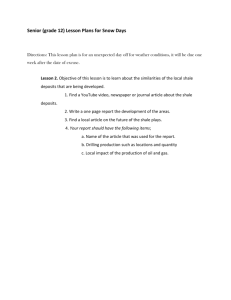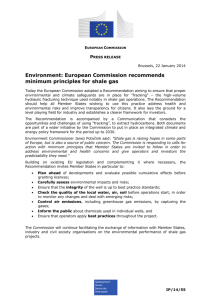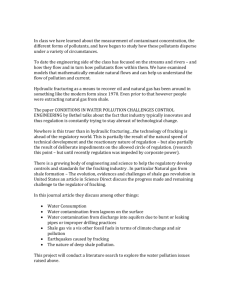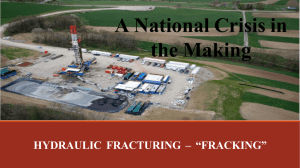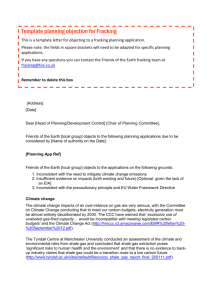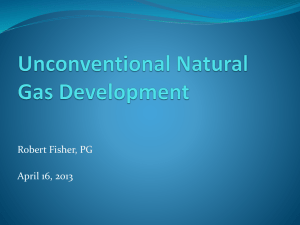Environment Canada to study hydraulic fracturing
advertisement
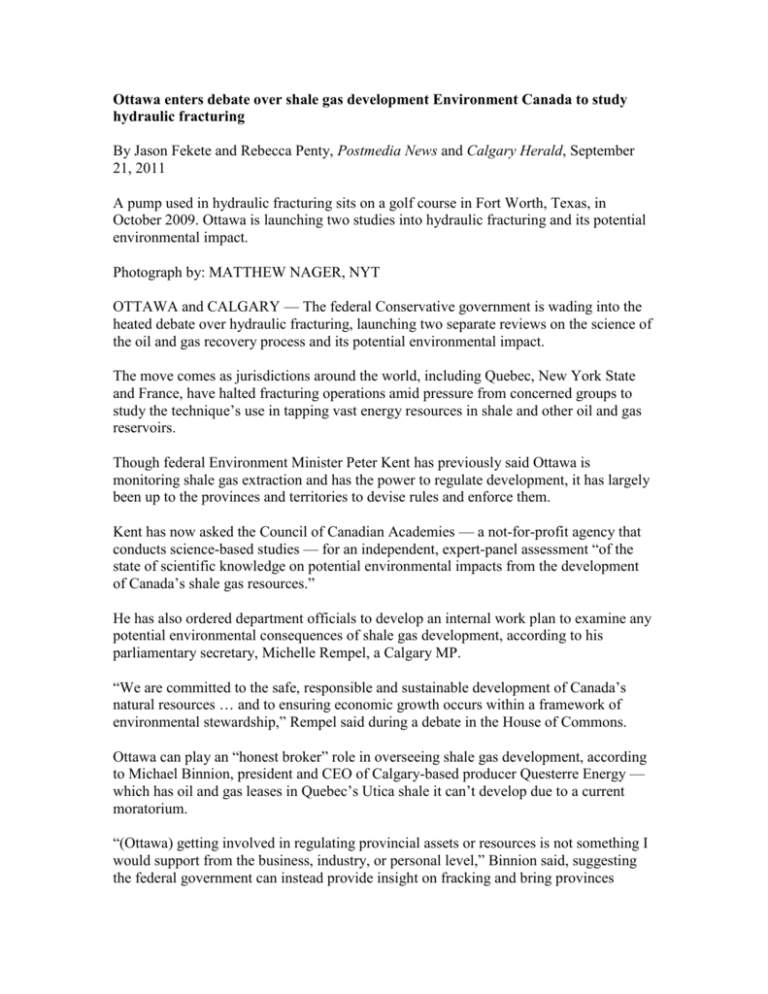
Ottawa enters debate over shale gas development Environment Canada to study hydraulic fracturing By Jason Fekete and Rebecca Penty, Postmedia News and Calgary Herald, September 21, 2011 A pump used in hydraulic fracturing sits on a golf course in Fort Worth, Texas, in October 2009. Ottawa is launching two studies into hydraulic fracturing and its potential environmental impact. Photograph by: MATTHEW NAGER, NYT OTTAWA and CALGARY — The federal Conservative government is wading into the heated debate over hydraulic fracturing, launching two separate reviews on the science of the oil and gas recovery process and its potential environmental impact. The move comes as jurisdictions around the world, including Quebec, New York State and France, have halted fracturing operations amid pressure from concerned groups to study the technique’s use in tapping vast energy resources in shale and other oil and gas reservoirs. Though federal Environment Minister Peter Kent has previously said Ottawa is monitoring shale gas extraction and has the power to regulate development, it has largely been up to the provinces and territories to devise rules and enforce them. Kent has now asked the Council of Canadian Academies — a not-for-profit agency that conducts science-based studies — for an independent, expert-panel assessment “of the state of scientific knowledge on potential environmental impacts from the development of Canada’s shale gas resources.” He has also ordered department officials to develop an internal work plan to examine any potential environmental consequences of shale gas development, according to his parliamentary secretary, Michelle Rempel, a Calgary MP. “We are committed to the safe, responsible and sustainable development of Canada’s natural resources … and to ensuring economic growth occurs within a framework of environmental stewardship,” Rempel said during a debate in the House of Commons. Ottawa can play an “honest broker” role in overseeing shale gas development, according to Michael Binnion, president and CEO of Calgary-based producer Questerre Energy — which has oil and gas leases in Quebec’s Utica shale it can’t develop due to a current moratorium. “(Ottawa) getting involved in regulating provincial assets or resources is not something I would support from the business, industry, or personal level,” Binnion said, suggesting the federal government can instead provide insight on fracking and bring provinces together. “There is a lot of different information about shale gas industry and hydraulic fracturing and it’s different enough that it can’t all be true.” The executive, who has testified on shale gas extraction at the House of Commons Standing Committee on Energy and the Senate Standing Committee on Energy, cautioned against Ottawa providing guidelines for development on the belief this would weaken regulatory regimes. Douglas Macdonald, a senior lecturer on business and environmental politics at the University of Toronto, said if Ottawa wants to weigh in on shale gas development, federal and provincial officials must commit to meet regularly on regulating the industry. Otherwise, the rules of the game are unclear, he said. “The environment may suffer, industry suffers. A lack of co-ordination is a real problem,” said Macdonald, who noted a “real absence,” currently, of any kind of institutional framework around energy and climate change. Hydraulic fracturing involves injecting water often mixed with sand and chemicals under high pressure, typically through horizontal wells to break up tight rock formations thousands of metres underground. Its use has come under fire from environmental groups who worry fracking is contaminating water and releasing large amounts of greenhouse gas emissions and property owners affected, who fear the value of their lands is eroding. The U.S. Environmental Protection Agency is in the midst of studying potential deleterious effects of fracking on drinking water resources and groundwater. Despite moratoriums in some jurisdictions, the practice has been critical for unlocking gas in the Horn River and Montney shale plays of northeastern British Columbia, a region industry players have said has enormous potential and is key to replacing declining gas production in the Western Canada Sedimentary Basin. Canada has no large-scale production of shale gas yet, but the Canadian Association of Petroleum Producers believes it could be key to meeting a growing natural gas demand in decades to come. Earlier this month, CAPP — the oil and gas sector’s main lobby group — published five broad guidelines it wants its members to follow during shale gas fracking, including safeguarding groundwater and more public disclosure on water use and fracturing fluid additives. Tom Huffaker, vice-president of policy and environment, said CAPP welcomes the review and hopes the science-based examination will address public concerns and further prove fracking is safe. “We get that our social licence to operate is about how we perform, it’s also about how we communicate,” Huffaker said. Matthew Bramley, director of research for the Pembina Institute, an Alberta-based environmental think-tank, said the review is needed to address insufficient scientific information on the environmental consequences of fracking. Bramley called for stronger federal regulations and mandatory disclosure of the industry’s use of water and chemicals when extracting shale gas. “There certainly is a significant hazard that is posed by hydraulic fracturing,” he argued, calling the process an injection of a “chemical cocktail” underground, near groundwater. Kent, repeating an industry refrain, has said hydraulic fracturing is a “rather old technique” used in conventional oil production that is now being applied to development of shale gas. NDP environment critic Megan Leslie cited fears the government is using reviews as a “stalling tactic” to delay any substantial regulations on development. “I find it hard to believe that Environment Canada and that the government doesn’t already know a lot of the information,” Leslie said. The Council of Canadian Academies is awaiting a formal written request from the environment minister, but assumes an expert assessment could take up to 18 months and include a panel of 12 to 15 experts from a variety of fields, said spokeswoman Cate Meechan. The final report would be based on scientific evidence, rather than stakeholder consultation, Meechan said. jfekete@postmedia.com and rpenty@calgaryherald.com © Copyright (c) The Calgary Herald http://www.calgaryherald.com/technology/Ottawa+enters+debate+over+shale+developm ent/5438868/story.html#ixzz1YeQG0EqL
